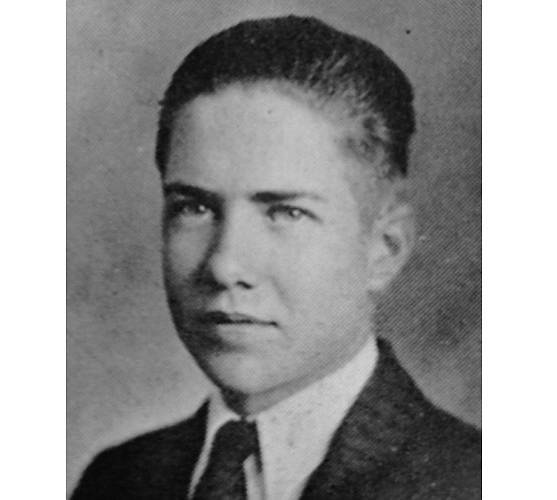William Rose was not your typical Jefferson City native.
From humble Missouri beginnings, his film career spanned two continents, multiple genres and many subject matters.
Rose was a volunteer for foreign armies, dramatic writer and gut-busting humorist. His Academy Award-winning film for best screenplay, "Guess Who's Coming to Dinner," will celebrate its 50th anniversary in December. That will make half a century of adding commentary and spurring debate on one of the greatest struggles in U.S. history: racial equality. Long after his death, stage adaptations and movie remakes keep his visions alive in the 21st century.
He was the brother of City Attorney Thomas Rose and son of June Rose, who lived at 117 Swifts Highway, according to reporting in the Jefferson City Post Tribune.
The sound of Rose's clarinet rang through the corridors of Jefferson City High School from 1929-32. At the time, his class was the largest in school history with 146 students, lauded in the 1930 yearbook as one of the most promising classes of the institution. He participated in the glee club, band and orchestra. A black and white yearbook photo shows a handsome but timid-looking young man with slicked-back hair holding his instrument like a soldier's rifle.
The faculty voted him into the National Honor Society - referred to as one of the highest honors conferred upon a student - for excelling in character, scholarship, leadership and service. His senior yearbook described Rose as affable - friendly, good-natured or easy to talk to.
He attended Columbia University but took a sharp turn from academia in 1939 when he traded his clarinet for a weapon and shipped off to fight for Finland after the Soviet Union invaded. He then volunteered for the WWII Canadian Black Watch Royal Highland Regiment before the United States entered the war. The Canadian army stationed him in Great Britain, where he remained to marry and attend screenwriting classes.
Although Rose faced initial shortfalls, he eventually gained notoriety with what the British Film Institute called a uniquely English voice - especially for a Jefferson City boy. He was nominated for screenplay Academy Awards for 1953's "Genevieve" and 1955's "The Ladykillers" - a film depicting money-hoarding robbers hiding out with an unsuspecting elderly woman that was remade with Tom Hanks at the lead in 2004. Rose later returned stateside to complete 1966's "It's a Mad, Mad, Mad, Mad World," a star-studded medley of classic shticks following a raucous cross-country treasure hunt. The ill-fated odyssey was loosely remade by Paramount Pictures in 2001 as "Rat Race."
"The Russians Are Coming" earned Rose another Oscar nomination in 1967, but it wasn't until his next film he would finally take home the prize.
Rose worked in Hollywood again the next year with the satirical "Guess Who's Coming to Dinner," which now marks its golden jubilee. The film revolved around an interracial romance. A 23-year-old white woman played by Katharine Houghton brings home her fiancé - a 37-year-old black doctor and Nobel Prize candidate who works with the World Health Organization - played by Sidney Poitier.
At first, her high-class San Francisco parents are reluctant to accept their daughter's surprise partner. This is especially true of the father, played by Spencer Tracy, who also starred in "It's a Mad, Mad, Mad, Mad World."
For some, it could be difficult to consider someone snagging a prominent doctor to be all that troubling. That the fiancé is black may be less of an issue for modern parents than their college senior meeting her husband-to-be on a Hawaii vacation only 10 days prior, as in the movie. However, during production, more than a dozen states still outlawed miscegenation regardless of the suitor's career distinctions or the couple's relationship history. It wasn't until five months before the release date interracial marriage was legalized by the landmark Supreme Court civil rights case, Loving v. Virginia.
"Guess Who's Coming to Dinner" earned commercial success grossing $56.7 million at the box office. It was nominated for 10 Oscars in 1968. Rose won Best Screenplay and Katharine Hepburn won Best Actress for her role as the white mother who eventually came to support the marriage.
The film retained historic acclaim as one of Hollywood's first portrayals of an interracial kiss. The scene was viewed as a challenge to racists in Southern white audiences during a time of extreme civil unrest over racial equality just one year before Martin Luther King Jr. was assassinated. After its release, Houghton and the director, Stanley Kramer, received death threats, according to the Los Angeles Times.
Race riots resulting from King's assassination dominated the Post Tribune's front page April 11, 1968, the day after the Academy Awards. A story about Rose's victory was delegated to the bottom right hand corner of page A1, beneath a story on suppressing rioters in Kansas City. His father said Rose was shooting a new film in England at the time but planned to visit Jefferson City that summer.
Some progressives said the film did not go far enough - after all, the chaste engaged couple kissed only once. Critiques have said the movie patronized the nation's racial divide more than confronted it. The New York Times reported it was a "most delightfully acted and gracefully entertaining film" that "seems to be about something much more serious and challenging than it actually is."
While the film's on-screen action was debated, behind the scenes was a different sort of sordid affair. Hepburn and Tracy had a more than 20-year hidden relationship while co-starring in nine Hollywood romances, though he had been married about 40 years. Tracy died six months before the film was released, and Hepburn never saw the finished version of her Oscar-winning performance, because the memories of Tracy were too painful.
While racial unrest has yet to abate in the United States, neither has Rose's legacy. Theater companies perform stage adaptations of this ever relevant story line. Rose did not live to see his script flipped in 2005, when Ashton Kutcher and Bernie Mac starred in "Guess Who,"which depicted a white man being introduced to his black future in-laws. Rose was credited as a writer on this reincarnation, though he died in 1987 at age 68 on the English Channel island of Jersey.


